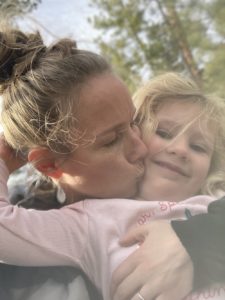By Cari Kimball

I’m writing this on my couch next to my gently snoring preschooler, Ruby. She is home sick. Again. The tenth day out of the past 30 that my husband and I have cobbled together sick and vacation leave to stay home with her. I’m building a multi-layered parfait of guilt – for not contributing adequately to MEIC, for pickling Ruby’s brain with another hour of “electronic babysitter” (aka PBS Kids) while I jump on Zoom meetings, and also for knowing that too many families lack the privileges of sick leave and accommodating employers. Amy Westervelt eloquently described this phenomenon in her essay in “All We Can Save” (10/10 recommend this book!), writing, “I’m reminded of parenthood and its requirement of endless trade-offs, thousands of choices between short-term and long-term benefits. Do I leave my kid sleeping during an unexpected nap, and take advantage of a free hour of work time, but deal with the consequences later when he’s up until 10…?”
The baselayer of my guilt parfait is anguish about the state of the world that we’re passing down to Ruby’s generation and future generations. Because of climate change and other forces of inequity, Ruby’s world will be increasingly characterized by extinction, drought and flooding, cataclysmic wildfire and weather events that in turn will prompt crop failures, famine, human conflict, displacement, and generalized suffering. In Montana, smoke from increasingly severe wildfires will impact air quality, exacerbating asthma and other respiratory diseases in the young and elderly. Even if Ruby’s relative privilege shields her from the worst, most immediate climate chaos impacts, I’m worried about what it will mean for our shared humanity in a world with so much suffering.
Sometimes the magnitude of these problems and my grief about our broken world overwhelm me. I feel keenly aware that our days on this planet together may be limited, and I’m tempted to pack our ragtag crew into our truck to go live in the woods. Again, Westervelt’s words resonate: “Every day I have to choose between what’s best for my own kids — probably more undistracted time with their mother — and what’s best for everyone’s kids — doing everything I can to ensure a livable planet… And for a lot of those hours when I’m worried about humanity, I am shushing or ignoring the little humans who are in my direct charge.”
I may not be making Westervelt-level contributions to fighting climate change, but I can do my part. Running away from these challenges would be an abdication of responsibility when the stakes couldn’t be higher. Westervelt’s essay also reminds me that the true nature of our world is one of interconnectedness across political differences, generations, species, etc. When times get tough, it’s best to turn toward my community, to do what I can to improve it, and bring it along, and work within it to imagine and create a more sustainable and connective future, one that is less characterized by human suffering, isolation, and impossible choices. It takes a village to raise a child, and it takes a whole lot of villages to save a planet.
This article was published in the March 2022 issue of Down To Earth.

